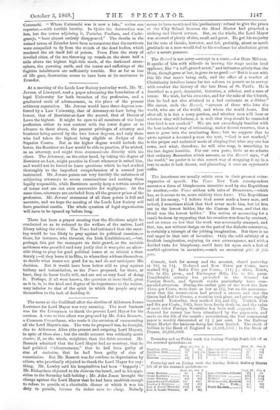At a meeting of the Leeds Law Society yesterday week,
Mr. W. Jevons, of Liverpool, read a paper advocating the foundation of a legal University for both branches of the profession, and a graduated scale of advancement, iu the place of the present arbitrary separation. Mr. Jevons would have three degrees con- ferred by a Law University, that of Attorney-at-Law being the lowest, that of Barrister-at-Law the second, that of Doctor of Laws the highest. It might be open to all members of the legal profession either to rest content with the lower degree or to -advance to those above, the present privileges of attorney and barrister being earned by the two lower degrees, and only those who had taken the highest being eligible as Judges of the -Superior Courts. But as the higher degree would include the lower, the Barrister-at-Law would be able to practise, if he wished, as an attorney, and might thus communicate directly with his client. The Attorney, on the other hand, by taking the degree of Barrister-at-Law, might practise in Court whenever it suited him, and would not be forced to leave questions which he had studied thoroughly to the imperfect comprehension of a counsel just instructed. Mr. Jevons points out very forcibly the unfairness of subjecting attorneys to severe examinations and making them legally responsible, while Barristers merely keep a certain number of terms and are not even answerable for negligence. At the same time, attorneys are excluded from all the greater prizes of the profession. Mr. Jevons' statement of all these points is full and accurate, and we hope the meeting of the Leeds Law Society will have practical results. The whole question of legal organization will have to be opened up before long.






























 Previous page
Previous page